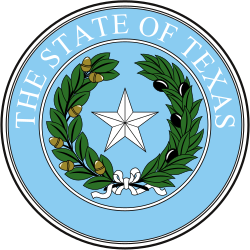| ||||||||||||||||||||||||||||
15 of the 31 seats in the Texas Senate 16 seats needed for a majority | ||||||||||||||||||||||||||||
|---|---|---|---|---|---|---|---|---|---|---|---|---|---|---|---|---|---|---|---|---|---|---|---|---|---|---|---|---|
| ||||||||||||||||||||||||||||
 Senate results by district Republican hold Democratic hold No election | ||||||||||||||||||||||||||||
| ||||||||||||||||||||||||||||
| Elections in Texas |
|---|
 |
The 2004 Texas Senate elections took place as part of the biennial United States elections. Texas voters elected state senators in 15 State Senate districts. All of the seats up for this election were for two-year terms, with senators up for re-election in the 2008 elections. The winners of this election served in the 79th Texas Legislature.
Contents
Following the 2002 elections, the Republicans maintained effective control of the Senate with nineteen members to the Democrats' twelve.
To claim control of the chamber from Republicans, the Democrats needed to gain four seats. In the end, no seats changed hands.
